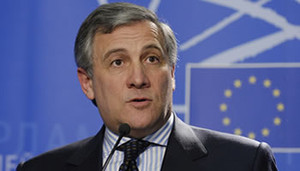Antonio Tajani: “Africa is the Continent of the Future”
 Africa accounted for only 1 per cent of global manufacturing and needs a new industrial policy to induce economic transformation, said the United Nations Conference on Trade and Development (Unctad) and the UN Industrial Development Organization (UNIDO) in a recent report. The UN assessment is shared by the European Commission Vice President and EU Commissioner for Industry and Entrepreneurship, Antonio Tajani, who still believes that “Africa is the continent of the future”.
Africa accounted for only 1 per cent of global manufacturing and needs a new industrial policy to induce economic transformation, said the United Nations Conference on Trade and Development (Unctad) and the UN Industrial Development Organization (UNIDO) in a recent report. The UN assessment is shared by the European Commission Vice President and EU Commissioner for Industry and Entrepreneurship, Antonio Tajani, who still believes that “Africa is the continent of the future”.
What is the European Commission’s industrial strategy in Africa?
Together with the African Union and the United Nations Industrial Development Organization (UNIDO), we are discussing about the implementation of the AU Strategy for the Accelerated Industrial Development of Africa (AIDA) that was approved at the Conference of the African Ministers of Industry in Algiers on 30-31 March 2011, having already been endorsed by the AU Heads of States and Government at the Tripoli Summit of November last. We are confident that our joint efforts especially in encouraging investment and growth will create employment and work for young people entering the labour market.
What are the key issues?
We are committed to promoting the private sector as a key driver of inclusive and sustainable economic growth and an important actor in driving forward more equal and balanced development. Our aim is to develop our industrial policy and cooperation built on three pillars, namely: reinforce Africa-EU industrial cooperation with the AU-EU Joint Action Plan to accelerate the industrialisation of Africa; formalise the AU-EU-UNIDO dialogue which would lead to the organisation of the AU-EU-UNIDO high-level Conference on industrial cooperation in 2012 and could associate the EU-Africa Business Forum (EABF); and finally develop our strategy on raw materials to promote diversification in the African economy.
What are the strategies and ambitions of European multinationals as regards the African market?
EU direct investment towards Africa is based on the prospects of African consumer markets. Some markets such as South Africa are already developing relatively strongly and have corresponding attracted strong investment. EU multinationals also invest in production and extraction facilities in Africa. A good regulatory and business environment helps stimulate such investment.
With European investment in industrial sectors, mainly manufacturing, in Africa and Ethiopia, remaining low, what new incentives is the EU planning to encourage European investment in African industries, specifically Ethiopia?
I propose that we strengthen our policies and industrial cooperation in terms of three main areas. The first is an EU-African industrial cooperation in the framework of a joint EU-AU Action plan to accelerate the industrialization of Africa. The second area is a AU-EU-ONUDI dialogue that will culminate in a high level conference focused on Industry that will take place in 2012. We could join it with the EU Africa Business Forum (EABF) , an active actor in the field of industrial policy. The third and last area is that of natural resources and the diversification of the economies of African countries. EU development assistance provides the tools for the development of the skills and infrastructure needed to attract international development. The EU unfortunately does not have the tools either to provide direct incentives or other encouragements private sector investment in Africa.
Youth unemployment remaining high in Africa, and Ethiopia, what does your department envision in terms of African efforts to generate employment?
During the Conference of African Ministers of Industry, I insisted on the importance of Africa as the continent of the future, highlighting the fact that the African economy is moving and is growing quickly. In order to carry on being the continent of the future, Africa needs industrialization and a system for exchanging goods with a strong added value. The first step could be to ensure that adequate organizational agreements are made, which means at a technical level both within the African Union and the European Commission.
Even more importantly, I would suggest that the AU nominates an “envoy for small and medium-sized enterprises which is to say an SME High Representative with the same role as our EU SME envoy, Daniel Calleja Crespo. His role consists of opening communication networks between the European Commission, SMEs and the organisations they represent. The other mission Mr. Crespo has is to ensure that the legislative proposals made by the EU Commission are thought to answer the interests of European SMEs. I am also convinced that these two “Mr SMEs” could stimulate EU-UA policies in this field.
Dowload here the full interview
Interview coordinated by Joshua Massarenti (Afronline.org), in collaboration with Les Echos du Mali, Sud quotidien (Senegal), Le Républicain (Niger) and Addis Fortune (Ethiopia).



